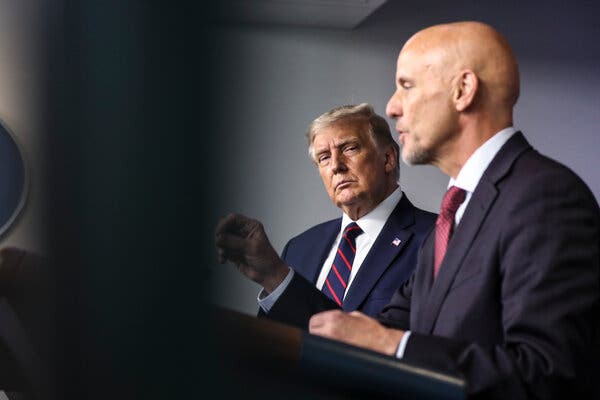As Britain approaches yet another new deadline to strike a trade deal with the European Union on Sunday, the pound is closing out its worst week in three months. It took a sharp turn lower against the euro on Thursday, and sunk further on Friday, as traders grappled with the prospect that Britain’s trade talks with the European Union could really fail.
“The markets tend to think as long as they are talking there is hope. I’ve been really cautious about that,” said Jane Foley, a strategist at Rabobank. “There may not be a deal but there will be disruption, even if there is a deal. And there will be political fallout.”
All of which is bad for the currency.
In just under three weeks, the Brexit transition period will end and, if no agreement is reached, Britain will be forced to do business with its largest trading partner on World Trade Organization terms, meaning tariffs would be introduced on goods and there would be less chance of future cooperation between services industries. So far three issues — fishing rights, business competition rules and how a deal will be enforced — have stalled the talks.
Prime Minister Boris Johnson went to Brussels on Wednesday night to dine with the European Commission president, Ursula von der Leyen, to try a breach the impasse. By time the fish dinner was over, there were reports that the outlook for a deal were even more gloomy. A new deadline was set for Sunday.
Then on Thursday, the European Commission laid out its plans for what it would do if there was no deal. And Mr. Johnson said an agreement was “not yet there at all” and that there was a “strong possibility” of no deal.
The perpetual optimism of the financial markets has been tested many times before. Innumerable Brexit deadlines have come and gone. But this time, there is serious concern about how an agreement, if one is reached, could be ratified into law before Jan. 1. The British Parliament is preparing plans to work until Christmas, but the European Union will have a harder time gathering 27 nations over the holiday period.
This week has been the worst for the pound since early September, when traders got spooked that Boris Johnson would thwart a trade deal by introducing a new bill that clashed with the E.U. withdrawal agreement and break international law.
Even before the end of the transition period, Britain got a glimpse at the type of disruption that occurs when trade isn’t running smoothly, when Honda shut down its assembly plant in England this week because parts were stuck in transit.
The economic impact of more trade disruption in the new year once customs checks begin will weigh on a British economy attempting to scratch out a recovery during a second wave of the pandemic. Data on Thursday showed that gross domestic product increased 0.4 percent in October, a slowdown before England went into a monthlong lockdown in November.
By: Ella Koeze·Source: Refinitiv
-
Stocks fell on Friday as investors steered away from risky assets despite news that the United States was likely to authorize the Pfizer-BioNTech vaccine within days. Instead traders are facing the prospect of a no-deal Brexit, a stalemate in Washington over economic aid and months of economic hardship as countries still struggle to contain the virus.
-
The S&P 500 fell slightly, while the Stoxx Europe 600 and the FTSE 100 in Britain were each about 0.8 percent lower.
-
Oil prices also fell on Friday, pulling back from a rally the day before when prices jumped to their highest since March. Futures of West Texas Intermediate, the U.S. benchmark, declined 0.5 percent to $46.57 a barrel.
-
Prime Minister Boris Johnson of Britain and the European Commission president, Ursula von der Leyen, have both said that it was looking more likely that Britain and the European Union would not come to an agreement on free trade by the end of year. Talks are expected to continue through the weekend.
-
In the United States, hopes of reaching a deal on fresh fiscal stimulus before Congress breaks were diminished. On Thursday, aides to Senator Mitch McConnell, the Republican majority leader, indicated that many Republicans would not agree to a bipartisan package that had emerged. The same day, data showed more than 947,000 people applied for unemployment benefits last week, a jump from the previous week.

England’s recent lockdown restrictions have led to an unlikely surge in sales of an oval, somewhat greasy and crumbly item of British gastronomy: the Scotch egg.
Makers of Scotch eggs are reporting huge jumps in sales to pubs because, by serving them, many establishments can also serve beer and other drinks to customers.
Scotch & Co., a supplier to pubs across Britain, saw a 25 percent increase in Scotch egg sales last week, to 7,500, and expects more as Christmas approaches, said Mark Davidson, a co-founder of the company. Brakes, a food wholesaler, told The Financial Times that it had seen a tenfold increase in the item.
One pub in London’s Notting Hill, the Cock & Bottle, sold 200 Scotch eggs last week, up from its regular sale of 20, said the pub’s manager, Andrew Loft.
Scotch eggs have rarely garnered this much attention. Typically composed of a boiled egg encased in sausage meat and bread crumbs and then fried or baked, often big enough to fill your hand and not especially light, they ranked among Britons’ least loved foods, according to a YouGov survey (alongside pork pie and bubble and squeak).
But their star turn arrived with the government’s latest pandemic lockdown rules, which are divided in three tiers according to the severity of the coronavirus’s spread. Under Tier 2, the category that covers London and most of England, pubs cannot provide alcohol for consumption on the premises “unless with a substantial meal, so they are operating as a restaurant.”
Many pubs serve meals, but others limit their food options to a bag of potato chips. But after the Tier 2 rules were announced, the definition of “substantial meal” inevitably came up. Government ministers proved insightful.
“I think a Scotch egg probably would count as a substantial meal if there were table service,” George Eustice, the secretary of state for environment, food and rural affairs, told a London radio station, LBC.
Later, one of Prime Minister Boris Johnson’s top ministers, Michael Gove, affirmed the egg’s standing as a substantial meal after first calling it a starter.
Scotch eggs, once relegated bar snacks with sausage rolls if they were even served at all, are now turning up on the menu at pubs. And customers know they can legally sit and enjoy their pint if they order a Scotch egg, too.
At the Happy Belly, a food company based outside Manchester, orders for Scotch eggs have jumped 500 percent, the company’s founder, Brendan Baury, said.
“Everybody in the country is talking about Scotch eggs and hearing Scotch eggs,” he said. “It’s been wonderful advertising for Scotch eggs in general.”
For pubs, the ability to serve more customers is a small consolation during a year when they have faced monthslong closures and curfews that left many chains fighting for survival. In the fall, two large pub chains each announced plans to lay off 500 employees. Others announced plans to cut 800 jobs, and let go more than 2,000 furloughed employees.

President Trump lashed out anew at the Food and Drug Administration in a Friday morning tweet, attacking the agency’s commissioner, Dr. Stephen M. Hahn, by name for not approving a Covid-19 vaccine faster.
Continuing his practice of publicly upbraiding subordinates with whom he is displeased, Mr. Trump told Dr. Hahn to “stop playing games and start saving lives!!!” He called the F.D.A. “a big, old, slow turtle,” flush with funds but mired in bureaucracy.
The F.D.A. has been walking a thin line, trying to fast-track vaccine approval without undercutting public confidence in the process. Dr. Hahn has repeatedly said regulators will not approve a vaccine that has not been proven safe and effective.
The president’s tirade came the morning after an outside advisory panel of experts voted overwhelmingly to recommend that F.D.A. regulators approve a vaccine developed by Pfizer and its German partner, BioNTech, for emergency use.
The regulators are expected to issue the authorization as early as Friday, and in a statement on Friday said it put the Centers for Disease Control and Prevention and those involved with Operation Warp Speed on notice “so they can execute their plans for timely vaccine distribution.”
Mr. Trump has said little about the pandemic in recent weeks, as cases and deaths have been mounting across the country. On Thursday, 2,923 people in the United States died from the virus, according to a Times database. More than 3,000 deaths were reported on Wednesday.
The president has repeatedly accused the F.D.A. and the vaccine-makers themselves of deliberately slowing the approval process in order to harm him politically. Allies of Dr. Hahn have been on tenterhooks for weeks, expecting him to be fired any day.
The president wrote that with “my pushing,” the administration had shaved years off the development of vaccines. “Get the dam vaccines out NOW, Dr. Hahn,” he wrote, misspelling the expletive.
One minute after the president’s tweet posted, Alex M. Azar, the Secretary of Health and Human Services, posted a “BREAKING” message on his official Twitter account, saying the F.D.A. had informed Pfizer that it was moving “rapidly” toward authorizing its vaccine. He was echoing a statement from Dr. Hahn and Dr. Peter Marks, the agency’s top vaccine regulator that officials say was posted before the president’s tweet.
Eileen Sullivan contributed reporting.
With the economic recovery faltering and federal aid stalled in Washington, state governments are stepping in to try to help small businesses survive the pandemic winter.
The Colorado legislature held a special session last week to pass an economic aid package. Ohio is offering a new round of grants to restaurants, bars and other businesses affected by the pandemic. And in California, a new fund will use state money to backstop what could ultimately be hundreds of millions of dollars in private loans. Other states, led by both Republicans and Democrats, have announced or are considering similar measures.
The efforts come as many businesses face an increasingly dire situation, The New York Times’s Ben Casselman reports.
A survey from the National Federation of Independent Business on Tuesday showed optimism falling and uncertainty rising as the nationwide surge in coronavirus cases leads governments to reimpose restrictions and consumers to pare their spending. Separate data from the Census Bureau shows an increasing share of small businesses cutting jobs, and other surveys have shown large numbers of businesses in danger of failing.
If that happens, it could be a disaster for both state economies and state budgets. Local businesses are major sources of tax revenue — both directly and through their employees — and major drivers of economic activity. If they fail in large numbers, it will slow the economic recovery once the pandemic is over.

The U.S. government and more than 40 states sued Facebook on Wednesday for illegally crushing competitors and demanded the company undo its acquisitions of Instagram and WhatsApp.
Here are five key questions about the case, answered:
1) What’s the argument from the government and from Facebook?
There’s a legal reason Instagram and WhatsApp are at the heart of the state and federal lawsuits. Trying to reduce competition by purchasing rivals is an explicit violation of America’s antitrust laws. That’s exactly what government lawyers say Facebook did and will keep doing.
The tricky thing, however, is that the government had given Facebook permission to buy Instagram and WhatsApp in 2012 and 2014. Facebook’s argument is that it’s unfair for government officials to try a do-over now, and that Facebook made Instagram and WhatsApp better than they could have been on their own.
2) How will the lawsuits affect people who use Facebook?
Lawsuits like this might take years to resolve. Your experience with Facebook, Instagram, WhatsApp or Messenger won’t suddenly be different tomorrow.
The more immediate impact from this legal fight could be subtle changes to these social apps because Facebook has one eye on its court cases.
Already, Facebook is working to make messaging features in multiple apps blend together more seamlessly behind the scenes, which could make a breakup more difficult. It’s also possible that Facebook might hold off on new acquisitions or change features in development to avoid hurting the company’s legal arguments.
3) Related: Will this hold Facebook back?
In an interview last year, Bill Gates said that if Microsoft had not been “distracted” by government antitrust lawsuits that started in 1998, his company’s Windows — and not Google’s Android — could have been the world’s most popular smartphone system. Gates was reflecting a common view among company executives of the time that the lawsuits made Microsoft more cautious and as a result the company missed chances to go in new directions.
It is possible that Facebook could alter its behavior because it is bogged down by court cases or worried about looking like bullies.
4) Why is this happening now?
The government is suing Facebook after years of their failures to restrain its power and because there is now political will to do so.
The Federal Trade Commission is the same government agency that was pilloried last year for extracting a manageable fine from Facebook and requiring privacy policy changes at the company with uncertain benefits for those of us who use the company’s apps. The same agency approved the acquisitions of Instagram and WhatsApp.
What’s changing now is that elected officials and other people in government are united in their frustration with America’s tech superpowers and more willing to call for sweeping changes.
5) What happens next?
People who want to change these companies, the internet and the American economy sometimes see antitrust lawsuits as catchall fixes. But antitrust cases, even if they’re successful, won’t necessarily address all the various and sometimes inconsistent grievances many people have.
No matter what happens with the Facebook case, there is no going back to more carefree times for the tech giants. In world capitals, courtrooms and among the public, we are wrestling with what it means for a handful of rich tech companies to influence our lives, elections, economies and minds.
-
Lululemon reported sales of $1.1 billion for the third quarter on Thursday, up 22 percent from last year, as shoppers bought leggings and other workout gear to stay comfortable and in shape while working from home. In North America, net revenue grew by 19 percent. Direct to consumer revenue — which includes online sales — increased 94 percent.
-
Walmart is preparing more than 5,000 of its stores to receive vaccine doses so they can be ready to distribute the shots once they meet regulatory approval and become available. The retailer said in a statement on Thursday that it was ensuring that it had sufficient freezers and dry ice to store the vaccine, and preparing to distribute the vaccine through its Walmart and Sam’s Club stores and in long-term care facilities like nursing homes. The company will rely on state governments to direct its distribution efforts.






